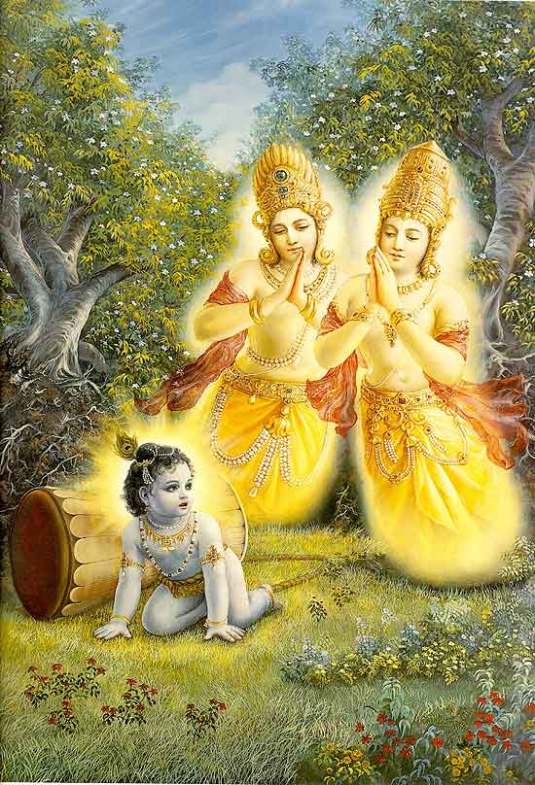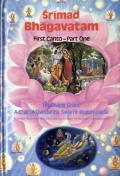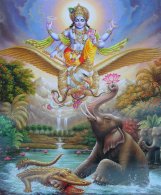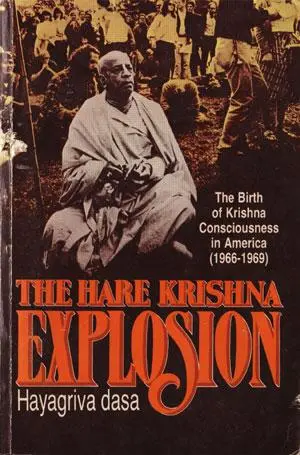
Vishnujana Swami with Radha Damodara
This will be an eight part series, with an explanation on each of the eight verses of the Sri Damodarastakam, given by Visnujana Swami. This eight sloka prayer is sung morning and evening during the month of Damodara, and which began today.
Sri Damodarastakam as explained by Visnujana Swami
namāmīśvaraḿ sac-cid-ānanda-rūpaḿ
lasat-kuṇḍalaḿ gokule bhrājamanam
yaśodā-bhiyolūkhalād dhāvamānaḿ
parāmṛṣṭam atyantato drutya gopyā
namāmi–I bow down; īśvaram–to the supreme controller; sat-cit-ānandarūpam–whose form is composed of eternity, knowledge and bliss; lasatkuṇḍalam–whose earrings play and swing; gokule bhrājamānam–who is splendrously manifest in Gokula; yaśodā-bhiyā–in fear of mother Yaśodā; ulūkalāt-dhāvamānam–who gets down from the wooden ricegrinding mortar and runs away; para-āmṛṣṭam–catching Him by the back; atyam–very much; tatam drutya–chasing after Him quickly; gopyā–by the gopī (Srī Yaśodā).
1) To the supreme controller who possesses an eternal form of blissful knowledge, whose glistening earrings swing to and fro, who manifested Himself in Gokula, who stole the butter that the gopis kept hanging from the rafters of their storerooms and who then quickly jumped up and ran in retreat in fear of Mother Yasoda, but was ultimately caught. To that Supreme Lord, Sri Damodara, I offer my humble obeisances.
Purport
The specific attributes of the Absolute Truth of the Lord, tattva-visesa, are addressed first. Satyavrata Muni begins with the offering of obeisances (namami) as an auspicious invocation, mangalacarana. He invokes the mercy of Lord Damodara to empower him to offer this prayer by the word isvara, the supreme controller. It also indicates that the Supreme Lord alone is worthy of the highest praise. It further implies the specific nature of devotional service, bhakti. The Lord manifests Himself in a form that embodies eternal existence, knowledge, and bliss. Thus, His supreme sovereignty is established.
The attribute of His enchanting beauty, rupa visesa, is described next. As He runs from Mother Yasoda, His earrings begin to swing back and forth lasat-kundalam. The earrings naturally sport upon His cheeks as He plays in the courtyard of Mother Yasoda. All the ornaments that adorn the Lord have become super-excellent by contact with His divine body, yet these earrings have attained superiority overall by the great fortune of constantly kissing His divine cheeks while swinging. They are glistening (lasanti) due to being enriched with the effulgence from the Lord’s complexion.
Uddhava describes Krishna’s beauty as so supremely enchanting that His transcendental body is the ornament of all ornaments.
Only in Gokula does Krishna display His most splendid pastimes that surpass all other manifestations of His excellence (gokule bhrajamanam) The word, gokule, indicates the place where cows and cowherds reside. The attributes of His family, parivara-visesa, thus further portray His unique excellence.
The last two lines of the verse describe the lila-visesa, the attributes of His excellent pastime as the butter thief. In fear of Mother Yasoda (yasoda-bhiya) He quickly runs away dhavamanam) from the mortar (ulukalat). Then, she also runs very swiftly (atyantato drutya).
“Krishna, at that time, was sitting on an upside-down wooden mortar for grinding spices and was distributing milk preparations, such as yogurt and butter, to the monkeys as He liked. Because of having stolen, He was looking all around with great anxiety, suspecting that He might be chastised by His mother. Mother Yasoda, upon seeing Him, very cautiously approached Him from behind. When Lord Sri Krishna saw His mother, stick in hand, He very quickly got down from the top of the mortar and began to flee as if very much afraid. Although yogis try to capture Him as Paramatma by meditation, desiring to enter into the effulgence of the Lord with great austerities and penance, they fail to reach Him. But Mother Yasoda, thinking that same Personality of Godhead Krishna, to be her son, began following Krishna to catch Him.
More



























